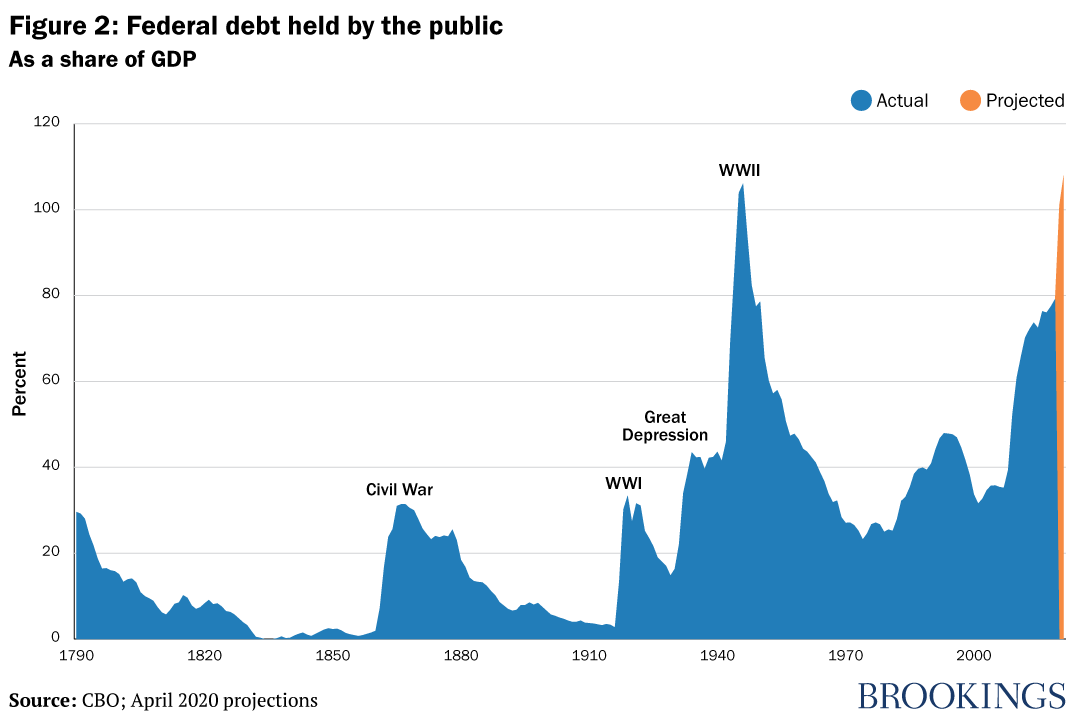In 2020 federal spending increased in response to the COVID-19 pandemic. It ran a deficit of over 7 percent of GDP in the Civil War.
 How Worried Should You Be About The Federal Deficit And Debt
How Worried Should You Be About The Federal Deficit And Debt
Beginning in 2016 increases in spending on Social Security health care and interest on federal debt have outpaced the growth of federal revenue.
/us-deficit-by-year-3306306_final-6fe17db00c73413eb26c0888ba0b5952.png)
Us deficit history. From 1800-1870 the United States ran a trade deficit for all but three years and the trade balance averaged about 22 percent of GDP. At the end of 2020 the deficit with China had. Experienced a recession from December 2007 to June 2009 characterized by high unemployment rates the burst of the housing bubble and major government bail-outs.
Bush was president for about a third of the 2009 fiscal year and Democrat Barack Obama took office and was president for the remaining two thirds. No one had done that since Word War II and Reagan had promised to balance the budget. Then from 1870-1970 it ran persistent trade surpluses that averaged about 11 percent of GDP.
Year Billions of US of GDP. By 2005 the federal deficit was at more than 81 trillion. Since 2001 the US.
On this page you will find a history of surpluses and deficits in the United States running all the way back until 1789. Visit our The Federal Response to COVID-19 analysis to learn more. It is calculated using Federal Surplus or Deficit - FYFSD and Gross Domestic Product GDPA.
The trade deficit in the US widened for the second month to USD 711 billion in February of 2021 from a revised USD 678 billion in the previous month slightly above market expectations of. A projection for 2013 is included as well. Housing prices prior to 2008 were dwindling and subprime lending for mortgages was prevalent.
While the United States has run a budget deficit nearly every year since 1961 the deficits really began to balloon during the 1970s and 1980s. By 2018 it had increased to 4189 billion before falling to 3452 billion in 2019. President Roosevelt presided over the largest percentage increase in the national debt in modern history but the third largest increase in Presidential history.
Louis in October 2012. Government has run a multibillion-dollar deficit almost every year in modern history spending much more than it takes in. As the graph shows the national debt was actually at its lowest point in 50 years compared to the US economy but Reagan grew the debt much faster than he grew the economy.
Federal Surplus or Deficit - as Percent of Gross Domestic Product FYFSGDA188S was first constructed by the Federal Reserve Bank of St. Table 13Summary of Receipts Outlays and Surpluses or Deficits - in Current Dollars Constant FY 2012 Dollars and as Percentages of GDP. Trade Balance - Historical Data.
Although he only added 236 billion this was a 1048 percent increase from the 23 billion debt level left by Herbert Hoover. Trade deficit with China was 3151 billion in 2012 rose to 3673 billion by 2015 before dropping to 3468 billion the following year. CBO Forecast for Federal Deficit.
Has experienced a deficit each year. Starting in about 1970 the United States began to run trade deficits again which have continued to this day. Over the 119 years since 1901 including the government estimates extending through 2019 the federal budget is 89 times 75 of the time on the red deficit and only 30 times 25 on the black surplus.
Thats why the graph shoots up when he takes office. Until 1949 the two are rather balanced. There are 18 45 surplus periods and 22 55 deficit periods.
But suddenly adjustable rates on mortgages. Directly underneath you will find an up-to-date table that contains all of the budget surpluses and deficits in the United States from 1940 until present day both in nominal dollars and inflation adjusted dollars. CBO Forecast for Federal Deficit Chart D05f.
In the 20th century the US ran a deficit during World War I the Great Depression World War II and in almost all years since 1960 during peace and war. And ran a deficit in the depressed 1890s. The opposite of a budget deficit a budget surplus occurs when the governments revenue exceeds current expenditures resulting in an excess of money that can be used as needed.
The biggest federal deficit on record is 1412700000000.
